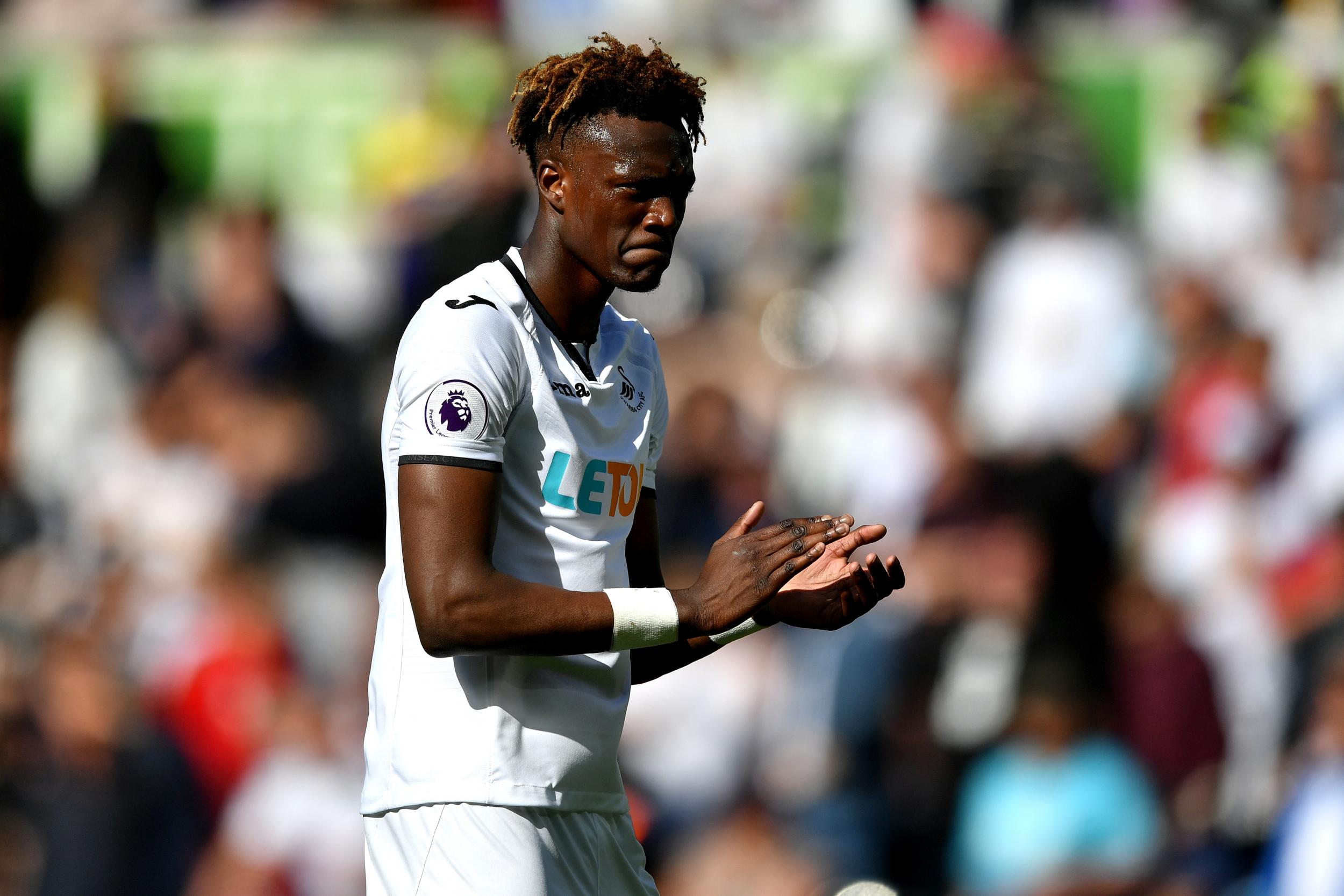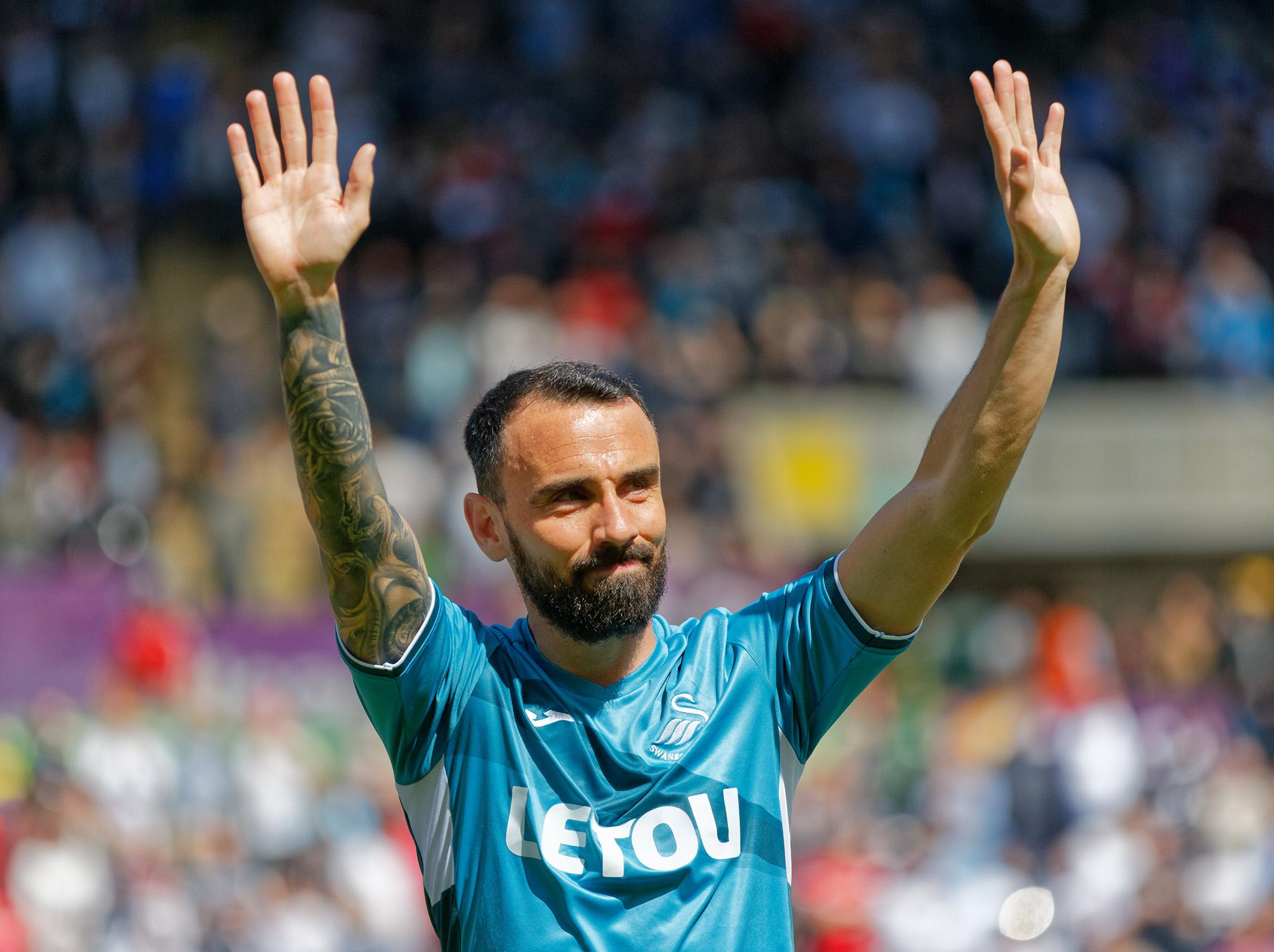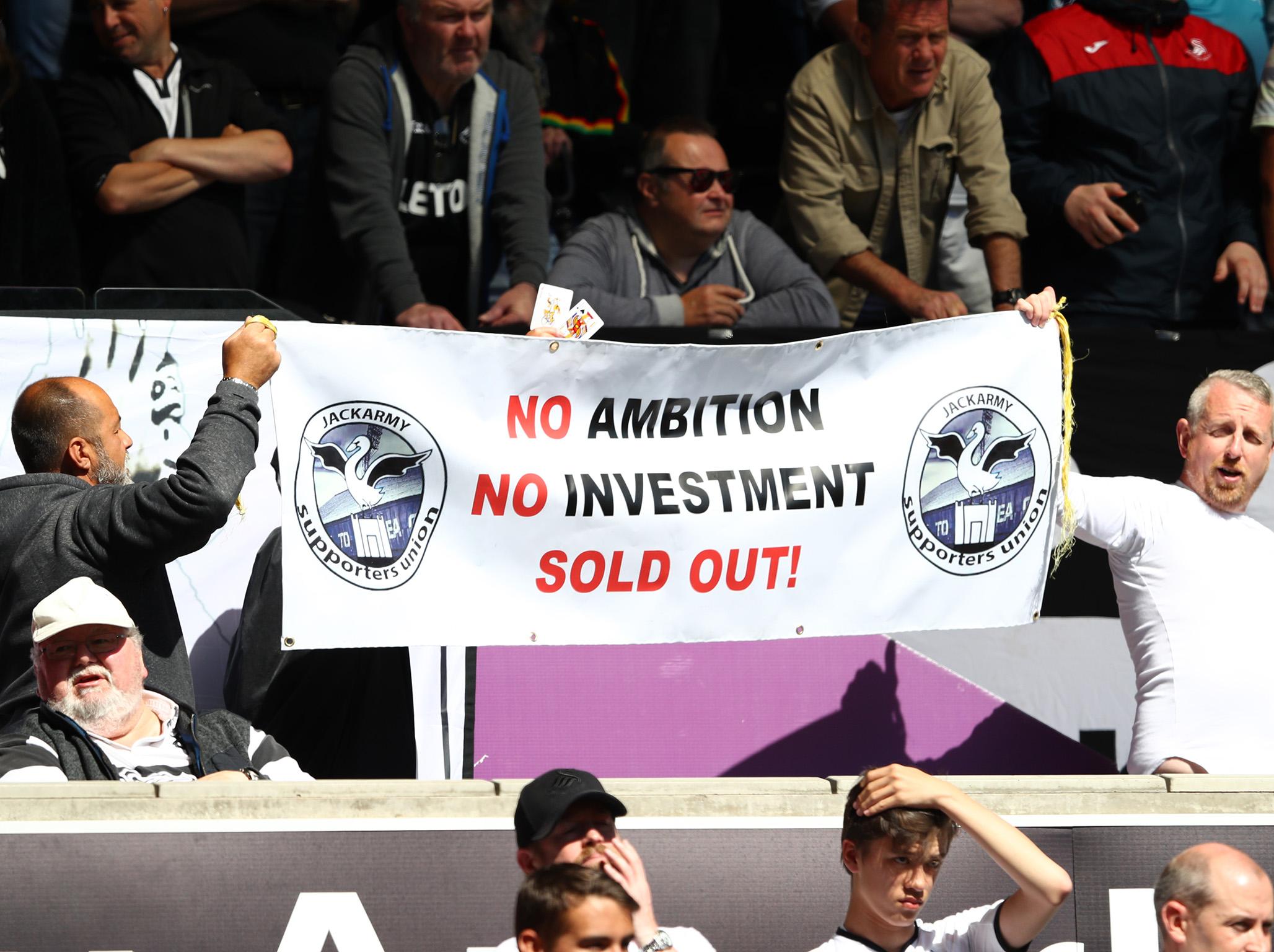Swansea’s relegation confirmed with defeat by Stoke as both clubs face fresh starts in Championship
Swansea City 1-2 Stoke City: Both teams were relegated and ultimately what perhaps links their predicaments is a loss of values

Your support helps us to tell the story
This election is still a dead heat, according to most polls. In a fight with such wafer-thin margins, we need reporters on the ground talking to the people Trump and Harris are courting. Your support allows us to keep sending journalists to the story.
The Independent is trusted by 27 million Americans from across the entire political spectrum every month. Unlike many other quality news outlets, we choose not to lock you out of our reporting and analysis with paywalls. But quality journalism must still be paid for.
Help us keep bring these critical stories to light. Your support makes all the difference.
Ahead of the game, the Stoke fans had gathered outside the Harvester restaurant to drown their sorrows and sing away their last afternoon in the Premier League. “You’re going down with the City,” they taunted their opponents. “How s*** must you be, you’re coming with us.” Watching them from a safe distance: a kid aged no more than six, his white Swansea top emblazoned with the name and number of Renato Sanches. Football dishes out its life lessons heartbreakingly early.
Of course Sanches, the midfield prodigy on loan from Bayern Munich who ends his Swansea career with one emoji and no goals, was nowhere to be seen here at the Liberty Stadium, as Swansea ended a seven-year spell in the Premier League in poetically fitting style. Twenty-four shots, the bulk of possession, and yet defeat to a Stoke side who hadn’t scored twice in a game since January. “That’s why you’re going down,” the Stoke fans trilled as yet another promising goalmouth opening went begging.
There had, at kick-off, been the faintest of possibilities that Swansea might just stay up if results went their way. But there was never any real conviction that the great escape was on. Within 15 seconds, Jordan Ayew had passed the ball straight to Xherdan Shaqiri, whose cross failed to clear the first man. Within a minute, the first “We want Jenkins out” chants had started, part of a long-running campaign of disenchantment with Swansea’s chairman. Within three, the Stoke and Swansea fans had united in a chorus of “going down, going down, going down”.
It was a poignant moment, perhaps for its tacit admission that deep down, perhaps these two sets of fans have more in common with each other than the suited zombies running their respective clubs. “You greedy bastards, get out of our club,” the Swansea fans sang, to a round of applause from their Stoke counterparts. Relegated themselves a week ago, Stoke know only too well the cycle of boom and bust, of mis-step and mismanagement, that brings a perfectly viable Premier League club to its knees.
For Stoke, the time to draw a curtain on a frequently thrilling decade at the top level is now, as they face up to the prospect of trips to Bristol City and Shrewsbury next season. There is no longer the time or the space or – frankly – the energy to chronicle the many errors on and off the pitch that have brought them to this point. No club gets relegated for a single reason, and whether through indecision, inaction or reckless recruitment, there are plenty of lessons to learn from Stoke’s first relegation in 20 years.
“Hindsight is a wonderful vantage point, however it is clear that significant errors were made in the transfer market,” admitted owner Peter Coates in a statement this week. “Unfortunately, the squad became unbalanced, and perhaps we lost some of the core values that have served us so well, and are so crucial when you have a bad spell.”
Ultimately, this is perhaps what links both Stoke and Swansea’s predicament: a loss of values. Stoke’s rugged directness and Swansea’s elegant passing game were more than a simple footballing tactic. They were a code, a creed, an identity, and in the fervid chase for survival, both mislaid the essence of what got them into the Premier League in the first place. They became lower-table fodder, two more mediocre host bodies onto whom agents could offload their hard-to-shift stock. The sheer number of passengers on the pitch – let alone those long since cast adrift – offered its own clues.
At least Stoke had one last victory to toast, after Badou Ndiaye and Peter Crouch overturned the early lead given to Swansea by Andy King. And as Swansea laid ham-fisted siege in the second half, they held firm, blocking numerous shots, going close to a third goal on more than one occasion. A desultory scattering of boos greeted the final whistle on 90 minutes – no injury time, for everyone’s benefit – which soon gave way to a warm ovation for Angel Rangel and Leon Britton, Swansea’s two departing stalwarts.

The end of an era, and in more ways than one. Rangel and Britton – limited but spirited players – encapsulated what made the old Swansea such dangerous opposition. They did the basics right, fought from first minute to last and most importantly carried the DNA of the club in their every step. Now they will need to be replaced, and Swansea’s recent record in the transfer market offers precious little cause for enthusiasm.
Swansea have, quite simply, bought and sold atrociously. Their signings over successive seasons have been of neither the required quantity nor the required quality. Sanches was but one dud in a basket full of them. Swansea seemed to get weaker with every transfer window, as the likes of Joe Allen, Wilfried Bony, Gylfi Sigurdsson and Fernando Llorente drifted out of the club and inferior players brought in. The club’s financial stature can only explain so much: last season their wage bill of £99 million was the ninth-highest in the Premier League, and roughly the same as what Tottenham spent in the season previous.
Ultimately, Swansea lacked both the expertise or footballing apparatus to compete at the highest level. Perhaps they believed that the essential character of the club – and of that it has retained plenty, at all levels – would be enough to see it through. But the decline from the peak years of Brendan Rodgers and Michael Laudrup has been patent and abject. Some of the football on display in the last couple of seasons has been, to be brutally honest, a disgrace.
Throw in a series of misjudged managerial appointments in Francesco Guidolin, Bob Bradley, Paul Clement and most recently Carlos Carvalhal – none of whom possessed Premier League experience and who were all essentially learning on the job – and the end was a long time coming. Wayne Routledge looks like the kind of guy who would play a Premiership footballer in a trashy ITV2 drama. The two Ayews probably add up to one decent forward between them. Tom Carroll would be an incredible footballer if the goals were on either side of the pitch rather than at either end. And those are the ones that made it.

And yet, for all the ineptitude, for all the blunders, you’re loath to be too hard on either of these clubs. They tried. Neither got relegated on purpose. And in a sense, change and churn is part of the natural life cycle of any club outside the elite: between them, Stoke and Swansea had spent just 29 out of 127 post-war seasons in the top-flight before their current spells in the Premier League.
People often say nobody has a divine right to be in this division. But of course, that’s not true. Some clubs do. If you are one of the gilded aristocracy who just so happened to be successful at the point when English football was showered with an unprecedented deluge of wealth, then even your gravest mistakes, your most spectacular cock-ups, will not relegate you.
Chelsea in 2015-16 under Jose Mourinho. Manchester United under David Moyes. Liverpool under Roy Hodgson. Tottenham under Juande Ramos. Arsenal in the later years under Arsene Wenger. Were any of these regimes any less calamitous or chaotic, any less poorly-run, then your average relegation candidate? I don’t think so. It’s just that at the top level, the margins of error are grotesquely fat, your disasters still relative triumphs. It’s a decade since any of the current top six finished even outside the top half, and their collective attempt to claim a bigger share of overseas TV rights represents just the latest attempt to unbalance the playing field still further.
Still, none of this will be much comfort to either set of fans when the fixture lists come out this summer, when they have to source their highlights not on Match of the Day but on Quest, Freeview channel 37. It’s been quite a ride – Wembley finals, European football, some unforgettable nights and some massive scalps. Now, in their own ways, both Stoke and Swansea will need to start again.
Join our commenting forum
Join thought-provoking conversations, follow other Independent readers and see their replies
Comments